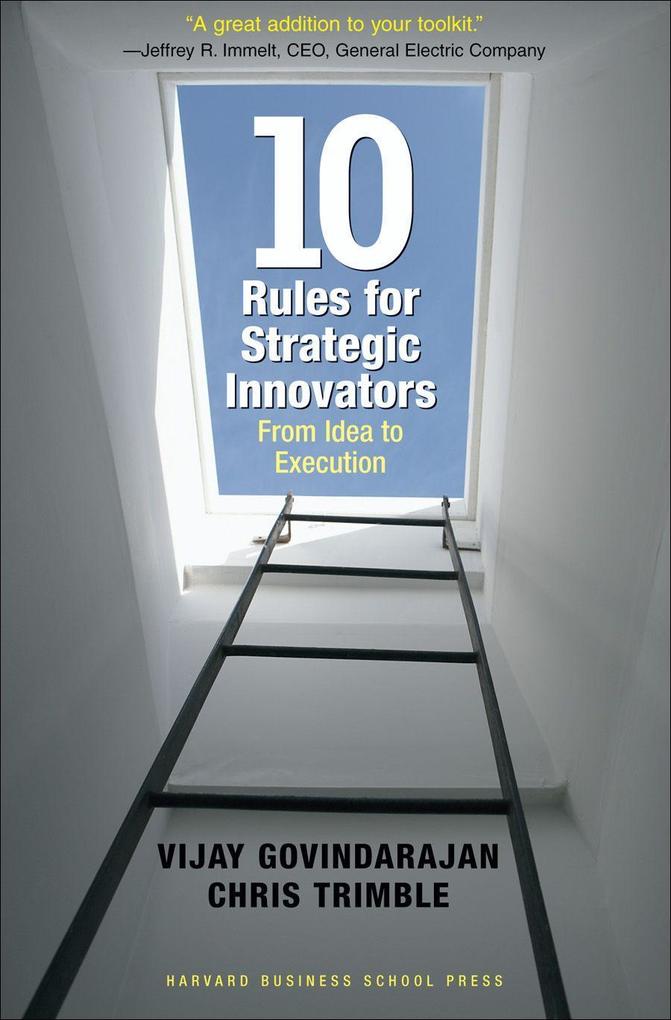
Zustellung: Di, 29.07. - Sa, 02.08.
Versand in 3 Wochen
VersandkostenfreiEven world-class companies, with powerful and proven business models, eventually discover limits to growth. That's what makes emerging high-growth industries so attractive. With no proven formula for making a profit, these industries represent huge opportunities for the companies that are fast enough and smart enough to capture them first. But building tomorrow's businesses while simultaneously sustaining excellence in today's demands a delicate balance. It is a mandatory quest, but one that is fraught with contradiction and paradox. Until now, there has been little practical guidance. Based on an in-depth, multiyear research study of innovative initiatives at ten large corporations, Vijay Govindarajan and Chris Trimble identify three central challenges: forgetting yesterday's successful processes and practices; borrowing selected resources from the core business; and learning how the new business can succeed.The authors make recommendations regarding staffing, leadership roles, reporting relationships, process design, planning, performance assessment, incentives, cultural norms, and much more. Breakthrough growth opportunities can make or break companies and careers. "Forget, Borrow, Learn" is every leader's guide to execution in unexplored territory.
Inhaltsverzeichnis
Introduction
Chapter 1: Why Innovation Needs a Different Kind of Execution
Chapter 2: Why Organizations, Like Elephants, Never Forget
Case: Corning Microarray Technologies
Chapter 3: Slaying the Elephant
Chapter 4: Why Tensions Rise when New Borrows from Established
Case: New York Times Digital
Chapter 5: Turning Tension into a Productive Force
Chapter 6: Why Learning from Experience Is an Unnatural Act
Chapter 7: How Being Bold, Competitive, or Demanding Can Inhibit Learning
Case: Hasbro Interactive
Chapter 8: How Being Reasonable, Inspiring, or Diligent Can Block Learning Just as Easily
Case: Capston-White
Chapter 9: Finding Gold with Theory-Focused Planning
Chapter 10: Ten Rules for Strategic Innovators
Case: Analog Devices
Chapter 1: Why Innovation Needs a Different Kind of Execution
Chapter 2: Why Organizations, Like Elephants, Never Forget
Case: Corning Microarray Technologies
Chapter 3: Slaying the Elephant
Chapter 4: Why Tensions Rise when New Borrows from Established
Case: New York Times Digital
Chapter 5: Turning Tension into a Productive Force
Chapter 6: Why Learning from Experience Is an Unnatural Act
Chapter 7: How Being Bold, Competitive, or Demanding Can Inhibit Learning
Case: Hasbro Interactive
Chapter 8: How Being Reasonable, Inspiring, or Diligent Can Block Learning Just as Easily
Case: Capston-White
Chapter 9: Finding Gold with Theory-Focused Planning
Chapter 10: Ten Rules for Strategic Innovators
Case: Analog Devices
Produktdetails
Erscheinungsdatum
01. Dezember 2005
Sprache
englisch
Seitenanzahl
256
Autor/Autorin
Vijay Govindarajan, Chris Trimble
Verlag/Hersteller
Produktart
gebunden
Gewicht
567 g
Größe (L/B/H)
241/164/25 mm
ISBN
9781591397588
Entdecken Sie mehr
Bewertungen
0 Bewertungen
Es wurden noch keine Bewertungen abgegeben. Schreiben Sie die erste Bewertung zu "Ten Rules for Strategic Innovators" und helfen Sie damit anderen bei der Kaufentscheidung.







